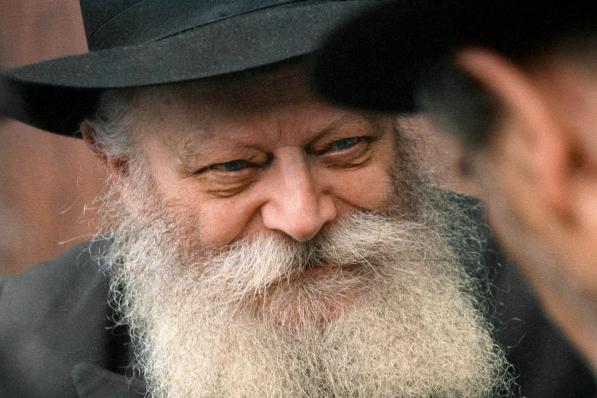The Rebbe’s Love for Every Jew
By Rabbi Pesach Schmerling
Director, Chabad Lubavitch of Far Rockaway
This Shabbos, the third of Tammuz, marks the 24th yahrzeit of the Lubavitcher Rebbe, Rabbi Menachem Mendel Schneerson, zt’l.
A Jew who learned in a yeshiva in his youth unfortunately left the path of Torah and became a judge in the Israeli Supreme Court. He was an outspoken opponent of Yiddishkeit, and wrote articles against Torah and mitzvos. Despite being a kohen, he married a divorcée as an open affront to Torah.
Once, on Simchas Torah, while in New York, he decided to join Israeli government officials who visited the Rebbe’s shul at 770 Eastern Parkway for hakafos. The Rebbe drew him close, even instructing he should be given a sefer Torah for a hakafah. The sefer Torah was a large, heavy one, and being that the shul was packed with thousands of chassidim, he struggled to carry it. Someone realizing this offered to take the sefer Torah from him. The Rebbe saw that interaction and intervened, saying: “A Jew wants to accept upon himself the yoke of Torah!” He then added, facing the judge: “The yoke of Torah with joy!”
Although this happened many years before social media, the news of what the Lubavitcher Rebbe did at hakafos “went viral.” As expected there were those who questioned, and even some who condemned, the Rebbe’s holy actions. Then there were those who defended the Rebbe. The defense typically was that one never knows what can cause a person to turn around his life, and the Rebbe was just trying to bring him back to his roots. While it is certainly true that the Rebbe was doing that, there was something much deeper happening there.
When the Rebbe’s name is mentioned, people usually associate him with the thousands of Chabad Houses and Chabad educational institutions all over the world, the hundreds of thousands of Jews who have taken on Torah and mitzvos, each on their level, as a direct result of the Rebbe’s holy work.
The Rebbe’s intense — I daresay infinite — love for every Jew is legendary. Human beings have a tendency to view others, and the world in general, through their own prism, and they have difficulty imagining something that truly transcends that view. When people hear anecdotes about the Rebbe’s love for another Jew, they often think that this was the Rebbe’s “tactic” to draw them to Torah and mitzvos. The truth runs much deeper. The Rebbe drew them to Torah and mitzvos, as this was the ultimate expression of the deep love he felt for every Jew. If I love someone, I want the best for him. Torah and mitzvos are the best for a Jew, more important than all other things.
When the Rebbe looked at anyone, he viewed that person at his or her core. The soul is one with G-d. At the core, every Jew is pure and wants to fulfill Hashem’s will at all times. There is a famous halachah in Rambam which states that deep down every Jew wants to keep mitzvos, and when he claims the contrary, it is merely his evil inclination controlling him. Many learned Jews are familiar with this halachah, but the Rebbe truly saw this when he looked at a Jew, and he related to the Jew accordingly.
The Rebbe was not naïve. He was very aware of all the shortcomings, perversions, and evil deeds committed by a person. The Rebbe was faced with these realities all the time, and helped thousands deal with myriad life situations resulting from these problems. Yet at no time did the Rebbe lose sight of the core person. All these issues, in the Rebbe’s eyes, are not what defines a Jew. A Jew is truly one with Hashem at all times. A Jew truly wants to keep Torah and mitzvos. The other “stuff” is not what defines him; they somehow got attached to him, but they are not him.
The Rebbe had the holy eyes to see through a person all the way to his very core, never allowing the other stuff to block his vision.
Did that judge become a complete ba’al teshuvah that night? Not exactly, but the Rebbe caused major turmoil in his inner struggles, and at the end of his life he left a will requesting to be brought to kever Yisrael (Jewish burial). For a person of his standing that was an unbelievable public step of teshuvah.
More important, however, than the outcome of that anecdote is what the Rebbe’s perspective means for us.
The obvious lesson is how we ought to look at another Jew, no matter how far removed from Torah and mitzvos he may seem from our obscured perspective. However, there is also a lesson here about how we ought to view ourselves. We have to view ourselves, and every other Jew, as the Rebbe did. Every Jew is a pure soul regardless of all surrounding “stuff,” and we must never lose sight of this truth.
To truly appreciate this perspective, imagine what an impact this can have if we instill this pure truth in our youth. No matter the twists and turns, even turbulence and downfalls, children or adolescents may experience, they will never lose sight of their true essence, identifying that this core is what defines them.
Source: 5TJT






